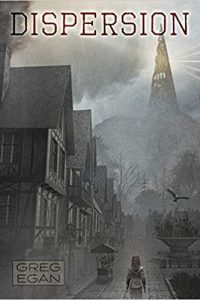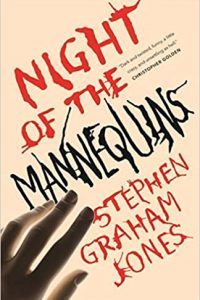Alex Brown Reviews This Wicked Fate by Kalynn Bayron
 This Wicked Fate, Kalynn Bayron (Bloomsbury YA 978-1-54760-920-8, $18.99, 320pp, hc) August 2022.
This Wicked Fate, Kalynn Bayron (Bloomsbury YA 978-1-54760-920-8, $18.99, 320pp, hc) August 2022.
Kalynn Bayron concludes her riveting This Poison Heart duology with This Wicked Fate. Briseis Greene begins the novel still reeling from the revelation that her family is descended from Greek gods. She is desperate to save her mother from her untimely death. With her family and friends at her back (and with her god-given gifts to make plants grow and an immunity to poison), she must confront heartless villains and discontented deities.
Where This Poison Heart leaned heavily on romance and mystery tropes, the sequel feels more like a quest out of, well, Greek mythology. Bri and her friends follow in Odysseus’s footsteps as they track down the final piece of the Absyrtus Heart, the Herculean task given to them by Hecate in exchange for resurrecting Bri’s mother. To succeed in their quest, they must use Bri’s brain and Marie’s brawn, as well as her Colchis aunts’ extensive connections, research notes, and accumulated wealth.
Obstacles obscure their path to victory. In Rhinebeck, enemies and agitators lurk, eager to use Bri’s plight to line their own pockets. Outside Rhinebeck, Ms. Redmond and her kin are also on the hunt for the Absyrtus Heart, but for their own selfish, nefarious desires. To Bri’s ever-increasing frustration, they seem to perpetually be two steps behind Karter’s family. Their quest will take Team Colchis all the way to their ancestral homeland, back to where it all began with Medea and her children.
Like This Poison Heart, This Wicked Fate deals largely with family, the kind you’re born into, the kind you build along the way, and the kind you rediscover. Karter and Bri act as contrasts. Both have large families with roots extending into the Greek pantheon, but while Bri’s offers unconditional love and boundless support, Karter’s is determined largely by one’s worth and power. There is no love in Karter’s life, not until he meets Bri. All he knows is punishment and exploitation, so much so that he cannot conceive of family acting like anything else until he meets Bri. He works against her, not because he hates her as his mother does, but because he’s terrified to lose the only family he has ever known, even though he knows his family couldn’t care less about his existence beyond his usefulness to their cause. By the time he realizes he could have had a place within Bri’s family, it’s too late.
Poor Karter feels trapped between fearing the wrath of his abusive family and wanting to make reparations to Bri for his destructive choices in the first book. I appreciated how Bayron didn’t give Karter an out for his behavior. He has done some terrible things, not by choice but by compulsion. But that does not mean he is exempt from the consequences of those actions. After all, intent does not determine impact. Bayron resists the redemption arc, thereby allowing Bri to hold him accountable. Young adults need to know they have permission to not forgive and forget, that they can move on with their lives without granting someone who harmed them forgiveness they have not earned.
Despite the heavy themes of loss, grief, abuse, and betrayal, Bayron infuses her story with love and affection. Support is the default mode for the characters on Team Colchis. Even when they disagree with each other, and even when they must break promises and keep secrets. Everything they do is with the focus of protecting the people they care about, no matter the cost of that protection. Again, that contrasts starkly with Karter’s family, who would gladly sacrifice one of their own for their own personal benefit, and with the pantheon, who step in only when absolutely necessary and only indirectly.
Bri draws on the support of her family and friends. She knows that she will not be able to succeed on her own. She needs her people and they need her. Relying on loved ones isn’t a sign of weakness but of strength, a lesson the gods and Karter’s family could stand to learn. Bri is strong on her own but stronger as part of a team.
This Wicked Fate closes out Bri’s story in a wholly satisfactory way. This duology blends modern adaptations of mythology with deep emotions, queer joy, and Black girl magic in a way that feels refreshing and unique. I had no idea what kind of journey Kalynn Bayron was going to take Briseis on when I started reading this book, but I loved every moment of it.
Alex Brown is a queer Black librarian and writer. They have written two books on the history of Napa County, California’s marginalized communities. They write about adult and young adult science fiction, fantasy, and horror as well as BIPOC history and librarianship. Diversity, equity, inclusion, and access set the foundation of all their work. Alex lives in Southern California with their pet rats and ever-increasing piles of books.
This review and more like it in the June 2022 issue of Locus.
 While you are here, please take a moment to support Locus with a one-time or recurring donation. We rely on reader donations to keep the magazine and site going, and would like to keep the site paywall free, but WE NEED YOUR FINANCIAL SUPPORT to continue quality coverage of the science fiction and fantasy field.
While you are here, please take a moment to support Locus with a one-time or recurring donation. We rely on reader donations to keep the magazine and site going, and would like to keep the site paywall free, but WE NEED YOUR FINANCIAL SUPPORT to continue quality coverage of the science fiction and fantasy field.
©Locus Magazine. Copyrighted material may not be republished without permission of LSFF.







